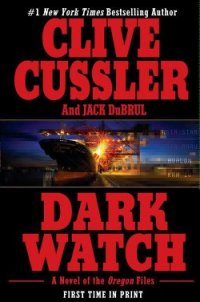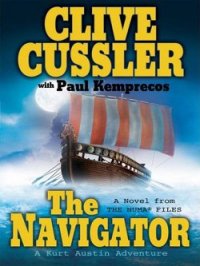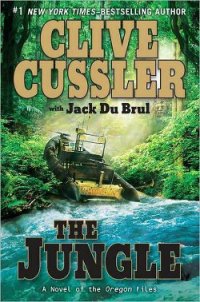Night Probe! - Cussler Clive (онлайн книги бесплатно полные txt) 📗
Pitt adjusted his face mask, threw Gunn a casual salute and dropped into the cold abyss.
At twenty feet he rolled over on his back and gazed upward at the bottom of the Ocean Venturer, which hovered above like a great dark blimp. At forty feet it faded into the murk and was gone. The world of sky and clouds seemed light-years away.
The water was dense and opaque, a dull green. As the increasing pressure tightened around his body, Pitt felt a prodding desire to turn back, lie down on his back in the sun, take a long nap and forget the whole thing. He shook off the temptation and switched on his dive light as the green dusk became black.
Then the enormous ship materialized out of the gloom in three dimensions.
An oppressive silence hung over the corpse of the Empress of Ireland. It was a phantom ship on a voyage to nowhere.
Pitt swam over the steeply sloping lifeboat deck, past the portholes and the eerie interior of the cabins beyond. He reached the edge of the excavation pit and hesitated. The water was noticeably colder at this level. He watched his air bubbles issue from the breathing regulator and rise to the surface in little clusters, merging and expanding upward. He pointed the dive light at them and they glistened like foam along a beach under a full moon.
He let himself glide slowly into the man-made cavity. Fifty feet down he settled as weightlessly as a leaf into the bottom silt. He was in the mangled womb of Harvey Shields' cabin.
An icy shiver ran down his spine, not from the frigid water his thermal suit kept him reasonably comfortable-but from the specters of his imagination. He saw the bones described by Collins. Unlike the bleached white and connected skeletons in medical school classrooms, they had turned a tobacco shade of brown and become separated.
A mound of clutter had piled up in front of a small opening in the tangled steel behind the larger of the two skulls and was partly covered with mud. He moved in closer and began probing with his hands.
He touched a limp, round object. He pulled it free and a cloud of dust like particles and tiny shreds of material billowed in front of his face mask. The object was an old life belt.
He worked himself into the opening and tore at the rubble. The dive light was nearly useless. The swirling disturbance in the water stonewalled the beam and reflected it like a thick bank of fog.
He came across a rusting straight razor, and nearby, a shaving mug. Then came a well-preserved shoe, an oxford by the look of it, and a small medicine bottle. The top was still sealed and the contents untainted by the water.
With the perseverance of an archaeologist sifting away the layers of time, Pitt explored the deteriorating junk with his fingers. He did not feel the cold seeping into his thermal suit. Without noticing, he had rubbed against sharp metal edges that sliced through the protective covering into his skin. Vaporlike trails of blood were issuing from several cuts on his back and legs.
His heartbeat quickened when he thought he saw his goal protruding from the silt. It was the arched handle of a piece of luggage. He wrapped his hand around it and gave a gentle tug. The badly corroded locking mechanism of a large suitcase came free. He shook away his false optimism and kept probing.
Two feet beyond, his eyes spotted another handgrip; this one was smaller. He paused and checked his dive watch. Five minutes of air were left. Gunn would be waiting. He took a long breath and slowly eased the handgrip out of the litter.
Pitt found himself staring at the remnants of a small hand case. The leather sides and bottom, though badly rotted, were still intact. Almost afraid to hope, he pried the hinges apart.
Inside was a muck-coated packet. Pitt knew instinctively that he held the North American Treaty.
Dr. Abner McGovern sat at his desk, stared thoughtfully at the cadaver stretched on the stainless steel table, and casually munched a deviled-egg sandwich.
McGovern was perplexed. The lifeless form of Jules Guerrier was not cooperating. Most of the tests on the corpse had been run four and five times. He and his assistants had analyzed the lab data endlessly, studied and restudied the results obtained by the police coroner of Quebec. And still the exact cause of death eluded him.
McGovern was one of those stubborn people who refuse to give up, the kind who stays up all night to finish a novel or add the last pieces of a jigsaw puzzle. He refused to give up now. A life did not simply cease without a reason.
Guerrier had been in pitiful physical condition. But the man was known to have a tremendous constitution. His will to live would never have extinguished like a lamp at the flick of a switch.
It had to be something other than a breakdown of bodily functions. It had to be from something induced.
Every test for poison had been run, even the exotics. All had proven negative. Nor was there evidence of the tiniest puncture from an injection needle under the hair or the nails, between fingers and toes, inside the orifices.
The possibility of suffocation kept returning to McGovern. Expiration from lack of oxygen left few telltale signs.
In the forty years he had served on the Mounties' forensic pathology staff, he could recall only a handful of cases where the victims were murdered by suffocation.
He slipped on a new pair of gloves and approached the stiff, as he referred to it. For the third time that afternoon he scrutinized the interior of the mouth. All was as it should be. No bruises, no paleness behind the lips.
Another dead end.
He returned to his desk and collapsed in the chair dejectedly, hands hanging loosely in his lap, eyes staring vacantly at the tile floor. Then he noticed a slight discoloration on the thumb of one glove. Idly he smeared it on a piece of paper, leaving a greasy pink smudge.
Quickly he bent again over Guerrier. Cautiously he rubbed a towel between the inner lips and outer gums. Then he peered at them through a magnifying glass.
"Ingenious," he murmured aloud as though conversing with the corpse. "Positively ingenious."
Sarveux felt terribly tired. His stand on noninterference with Quebec independence had met with a storm of opposition from his own party and the English-speaking loyalists in the west. The Parliament members from the Maritime Provinces had been especially indignant over his break with national unity. Their anger was to be expected. The new Quebec nation isolated them from the rest of Canada.
He was sitting in his study, sipping a drink while trying to wash away the day's events, when the phone rang. His secretary told him that Commissioner Finn was calling from Mountie headquarters. He sighed and waited for the click of the connection. "Mr. Sarveux?"
"Speaking."
"It was murder," Finn said bluntly.
"You have proof?"
"Beyond a doubt."
Sarveux gripped the receiver tightly. God, he thought, when will it end? "How?"
"Premier Guerfier was smothered to death. Damned clever of the killer. He used theatrical makeup to cover the evidence. Once we knew what to look for we found traces of tooth marks in the fabric of a bed pillow."
"You'll keep after Boucher."
"No need," said Finn. "Your report from British intelligence was most opportune. The print on the doorbell matches the right index finger of Foss Gly."
Sarveux closed his eyes. Perspective, he told himself; he must keep a perspective. "How is it possible Boucher mistook Gly for Villon?"
"I can't say. However, judging from the photo in the report, there is a slight resemblance. The use of makeup on Guerrier may be a key. If Gly could fool our pathologists, he may be enough of a master of disguise to fix himself up to pass as the spitting image of Villon."




